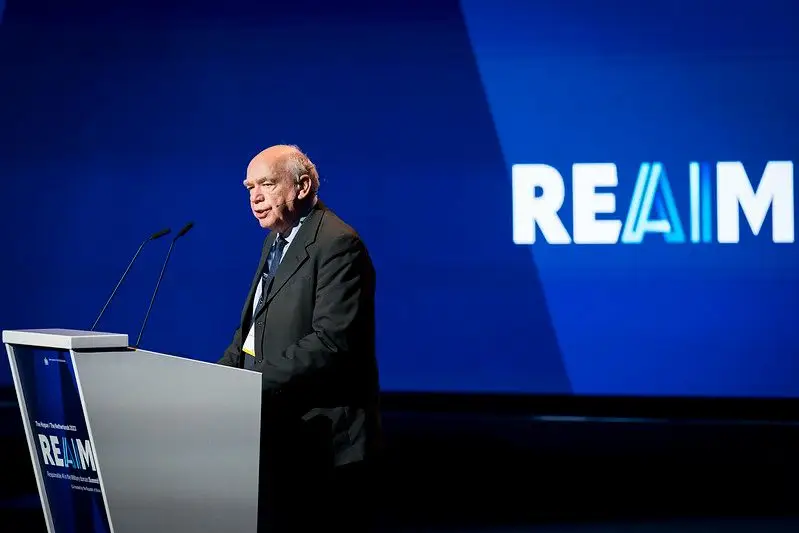Although there were high expectations that cyber will be the defining feature of future warfare, the reality that we have seen in the year-long war between Russia and Ukraine tells a different story, according to a western military expert on Wednesday.
“There have been well over two thousand cyberattacks mounted by the Russians during the course of 2022,” Lawrence Freedman, a professor emeritus of war studies at King’s College London, said in the plenary opening session of the REAIM summit. “[Cyberattacks] declined during the course of the war and (…) they haven’t really been that effective.”
The REAIM, which was held in The Hague, is the first international summit on responsible military use of artificial intelligence. The event was hosted by the Netherlands and co-hosted by South Korea. The Readable participated in the live streaming event of the conference, which was held in the residence of the Ambassador of the Kingdom of the Netherlands in Seoul.
Freedman spent about one third of his twenty-minutes speech addressing the reasons why Russia, one of the “masters” of cyber war, was unsuccessful in their cyber operations against Ukraine. “First of all, attack takes years to prepare. Months at least,” said the professor. “You need to know your target, and if your target is changed, then a lot of the work you may have done beforehand isn’t of much use.”

The military expert also explained that Ukraine had learn from their past sufferings and with the cooperation of private companies from the U.S. and U.K., particularly Microsoft, tried to find ways to defend the country from foreign aggression in cyberspace. According to a report by the European Parliament, which was issued in June of last year, Ukraine has been repeatedly subjected to Russia’s cyberattacks since Russia’s annexation of the Crimean Peninsula in 2014.
Moreover, the expert claimed that we have to delve into the problems that Russia was facing during the battle. “Over the course of the war about the 10% of its information technology experts have left [the country],” said Freedman.
He assumed that the reasons behind their departure could be various. Some might not have been interested in participating in the war or some might have been worried about how cyberattacks could spread to neighboring countries and draw unforeseen involvement. “We all know about past cyberattacks that have rarely stayed with the original targets,” the expert added.
The professor stressed that we have to keep in mind that conventional warfare could be favored in place of cyber warfare. “Well over half of their cyberattacks have been on Ukraine’s civil infrastructure, but you don’t actually hear a lot about that because, first, these attacks themselves weren’t that successful,” asserted Freedman. “But most importantly, go back to good old fashioned high explosives if you want to destroy civilian infrastructure. That’s how it’s been done.”


